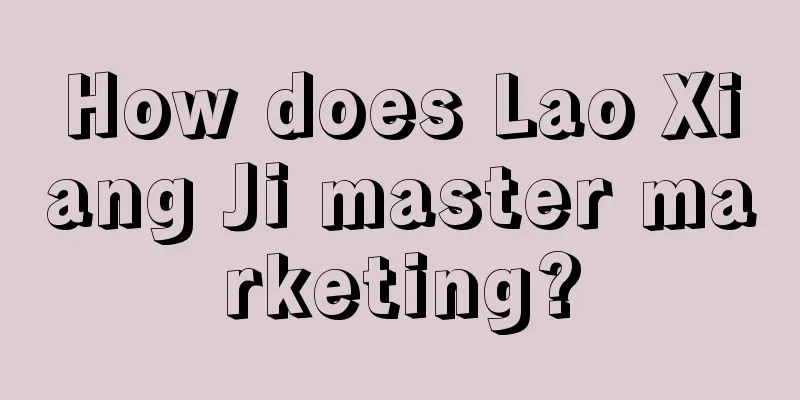Abandon "traffic-based growth" and start "strategic-based growth"

“Growth is not essentially a traffic issue, but a strategic issue.” This is my increasingly firm belief in the past two years. This belief stems from a growth crisis that our own men’s grooming brand “Dear Boyfriend” encountered… 1. From Growth Crisis to Strategic BreakthroughI am General Liang, the founder of Jiangyi Consulting and the chief strategy officer of Zanyi Growth Network. We were originally an advertising group, which includes various business sectors such as strategic consulting, visual design, brand building, entertainment marketing, product promotion, user operation, and brand incubation. Perhaps all those who have been working as a second party for a long time have a desire to be a first party. At the end of 2019, my two partners, Stephy and GiGi, took advantage of the new consumption wave and rushed into the men's daily chemical track and founded Dear Boyfriend. Although they had to explore the completely unfamiliar supply chain system bit by bit, with years of experience and connections, Dear Boyfriend quickly became successful, raised four rounds of funding, and achieved monthly product sales of tens of millions. But all entrepreneurial stories are the same, with highs comes lows. In 2022, when Dear Boyfriend finally hatched its first hit product, "Pilot Perfume", we decided to expand the product line and realize Dear Boyfriend's ambition of becoming a "one-stop men's grooming brand" as soon as possible. We immediately developed various product lines such as mouth spray, sunscreen, antiperspirant spray, bare face cream, oil-absorbing paper, facial mask, hair spray, hair wax, etc. But after the special period, consumers' wallets began to tighten, and we found that Dear Boyfriend had become a "fat" brand. Except for the "Pilot Perfume", we did not have any new hit products to continue to seize the men's market segment. Everyone has their own path dependence. As entrepreneurs who started out as advertisers, we were initially more accustomed to relying on marketing to solve business problems:
Dear Boyfriend can get a higher ROI, enjoy the best ideas for free, and get first-line resources without any effort... But these natural advantages can only help us outperform our competitors in terms of efficiency. That year, Dear Boyfriend was stuck in a growth bottleneck and couldn't breathe until everyone started to think about how to break through from a strategic level. "I've realized one thing: the men's daily chemical market is indeed awakening, but it is still far from as mature as the women's daily chemical market. For the vast majority of Chinese men, the biggest demand is still 'cleaning', and we still have to grasp 80% of the needs of 80% of the population." GiGi said this on the phone once. We decided to focus on men’s “necessities”, which are things that users need regardless of whether they have money or not. After figuring this out, Stephy and GiGi set their sights on the biggest pie of "men's cleansing". In the men's cleansing market, the largest product lines are facial cleansers, shampoos and shower gels. After returning to rationality, we began to think: What other unmet cleaning needs do Chinese men have? We found that the biggest difference between men and women in grooming is that women like to buy products in different categories and like to study the ingredients and effects of products. But men are different. Men are more afraid of trouble and like to solve all problems at once. Stephy and GiGi had a flash of inspiration: facial cleanser, shampoo and shower gel can be turned into one product! Let men solve the problem of full body cleaning at one time! So, we developed a "full body soap" that you can use to wash your hair, face and bathe, and the body will still have a fragrance after use. It can be said that it is a combination of facial cleanser, shampoo, shower gel and perfume. Within half a year of its launch, this soap jumped to the top of the men’s soap category on Tmall, with sales of more than 200,000 pieces. It also became a super hit in our Douyin store. Why is this product in the form of "soap"? Because when we were researching, we found that men have a stubborn impression about cleaning, that is, they generally believe that soap is the cleanest. Moreover, the facial cleanser and shampoo market is too competitive. How can shampoo beat Clear? How can facial cleansers compete with Nivea and Mentholatum? Therefore, we did not design the product as a "facial cleanser" or "shower gel", but innovated in the product form and designed this "soap". It turns out that we were right. Dear Boyfriend turned this full body soap into another hit product, successfully breaking through the past growth bottleneck. This growth crisis of Dear Boyfriend has made us realize one thing: growth is not essentially a traffic issue, but a strategic issue. 2. What you think are traffic problems are actually strategic problemsReal high-speed growth and excess profits come almost exclusively from two dimensions: traffic dividends and strategic breakthroughs . Traffic dividend means that you catch up with the explosive period of platform or channel traffic, such as the rapid growth period of mobile phones or the rapid growth period of short video platforms. The growth during this period is very deceptive. We may mistakenly believe that success comes from good products, strong operations, and high cognition. But when the dividends gradually disappear, we realize that our business is just "shit" and we just happened to have "shit luck." The reason why most companies encounter growth bottlenecks is probably that after the traffic dividend period has passed, they still use the same strategies as during the traffic dividend period. At this time, we actually need to redeploy our corporate strategy based on the current traffic environment and pay attention to which business links within the company are hindering growth. But unfortunately, most founders are still accustomed to asking for things from outside, rather than looking inward. They would rather spend 2 million to sign a young spokesperson than find a consulting company to thoroughly sort out their corporate strategy. When entrepreneurs experience growth anxiety, they are more likely to engage in short-sighted behavior. The most common actions are to slash product prices and find big anchors to clear inventory. This behavior can indeed bring short-term growth, but all traffic games only bring the illusion of growth. When the tide recedes, you will find that you are still swimming naked. I call this growth model "traffic growth" . The model corresponding to "traffic growth" is called "strategic growth". "Strategic growth" means that we do not fill GMV through traffic, but solve the traffic problem from the root by resolving bottlenecks in business links such as brand, category, product, and channel. Moreover, I increasingly feel that what you think are traffic problems are essentially strategic issues. Why did Yidao Car Rental lose to Didi and Kuaidi in the end? When recalling this entrepreneurial experience, founder Zhou Hang admitted that one of the fatal mistakes he made was to treat a strategic issue as a traffic issue. Yidao Car Rental is positioned as a business car service, and its target customers are first- and second-tier business people. The cars are better and the service is more thoughtful, but the price is also higher. At that time, the biggest problem Yidao encountered was that the cost of acquiring customers was too high. Their early private cars were all Mercedes-Benz and BMW-class cars, and they could earn 360 yuan per order, but they had to spend nearly 1,000 yuan to acquire a customer. At that time, Zhou Hang was always thinking about making some breakthroughs in marketing, hoping to find a marketing expert to help him reduce the cost of acquiring customers. After the failure of this business venture, he realized that this was not a matter of marketing at all, but a matter of product form! If the product price was adjusted at that time, a private car ride for 10 yuan, or a mass-market product was simply launched, the cost of acquiring customers would have dropped like an avalanche. Because Internet services are different from consumer goods, the essence of the Internet is to eliminate class differences. All high-end products must have higher conversion rates than mass, high-frequency, low-priced products. For example, there were many luxury e-commerce apps back then, but most of them died because the cost of acquiring customers was too high. Platform-based e-commerce may need 10 yuan to acquire a customer, while vertical e-commerce may need 200 yuan to acquire a customer. Finding traffic depressions and finding better agents to reduce customer acquisition costs are all traffic-based means, and in the end they will be a drop in the bucket. The biggest problem with luxury e-commerce platforms is their product structure. The niche and low-frequency product structure leads to very low business efficiency. Again, what you think are traffic problems are actually strategic problems. We must strive to switch from a "traffic growth" mindset to a "strategic growth" mindset. Moreover, "strategic growth" will become increasingly important because the world has entered the "consumption saturation era." "The era of consumption saturation" is a concept proposed by Toshifumi Suzuki, the helmsman of Japan's 7-11. The phenomenon that Toshifumi Suzuki observed in Japan is the same as what we observe in China. He used a very interesting metaphor to understand the shopping psychology of current consumers. If a person is not full and there is a pile of food in front of him, he will first choose the food that can fill his stomach and save his favorite food for last. But if a person is full, his behavior is the opposite. He will first choose his favorite and rarest food to eat. In a saturated market, simply delivering products to users is useless. If users feel that the product is not new and cannot find a reason to buy it, they will not pay for it even if it is cheap or of good quality. Just like our dear boyfriend’s full body soap, if we had only launched a facial cleanser at the time, there would be no need for men to choose a completely unfamiliar brand, even if our packaging was beautiful and the price was cheap enough. It is precisely because we strategically pioneered the concept of “full body soap” that this product can sell like hot cakes. 3. When the traffic dividend reaches the bottom, strategy is 1000 times more important than traffic!When the traffic dividend hits the bottom, strategy is 1,000 times more important than traffic! Is 1,000 times an exaggeration? I don’t think it’s an exaggeration at all. We can use a picture to compare the efficiency difference between “traffic-based growth” and “strategic-based growth”. Traffic is essentially an exposure opportunity, an opportunity to push a company's products or services to customers. But if the product or service itself is not good, no matter how many opportunities there are, it will be useless. To put it bluntly, "strategic growth" means that we should first focus on the efforts before the decimal point and ignore the efforts after the decimal point. Don't let tactical diligence cover up strategic laziness. If we look at Pinduoduo’s strategic deployment, it is easy to understand what “strategic growth” is. In June 2019, Pinduoduo launched a "10 billion subsidy" that shook the e-commerce industry. For the Internet industry, especially the e-commerce industry, subsidies are a common practice. Initially, the industry only regarded Pinduoduo's "10 billion subsidies" as a regular promotional activity, but who would have thought that Pinduoduo's "10 billion subsidies" was a wolf in sheep's clothing. What is different from regular e-commerce subsidies is that a large part of Pinduoduo’s “10 billion subsidies” is subsidized for iPhone phones. It is said that throughout 2019, Pinduoduo sold about 2 million iPhones through the "10 billion subsidies", and each iPhone was said to be subsidized by at least 300 yuan. Throughout 2019, Pinduoduo had a net increase of 167 million users! Why iPhone? First, Pinduoduo, which occupied the lower-tier cities, urgently needed to "enter the city" and let people in first- and second-tier cities install the APP. iPhone is the hard currency for people in first- and second-tier cities and is a natural filter for people. Secondly, the biggest problem with all e-commerce subsidies is that they easily attract a group of worthless freeloaders. All new customers attracted only to achieve GMV growth are essentially worthless. But even if Pinduoduo offered subsidies, an iPhone is still a commodity that costs several thousand yuan. There is no essential difference between users who buy an iPhone at full price and users who buy an iPhone at a low price. Both users have strong purchasing power. Finally, subsidizing iPhones is a typical misaligned competition, which will make it difficult for Alibaba and JD.com to follow up. By subsidizing iPhones, Pinduoduo has attracted high-end customers that were previously difficult to reach, but if Alibaba and JD.com also subsidize iPhones, they will only attract old customers to re-consume. The two competing parties paid the same cost, and Pinduoduo got the new volume it wanted the most, while Alibaba and JD.com only got the data of activated users and failed to directly snatch away Pinduoduo's lower-tier population. If Pinduoduo simply spread out the "10 billion subsidies" evenly, this would be "traffic-based growth." But when Pinduoduo chose the iPhone as a lever, the "10 billion subsidies" became "strategic growth." This is why Zanyi and I decided to set up Jiangyi Consulting to be a consulting company rather than an advertising company. Because consulting companies are about strategy, while advertising companies are about communication. Consulting companies will fundamentally solve clients' growth anxiety. After two years of entrepreneurship and a series of client practices, we have summarized the problems of enterprise growth into ten strategic strongholds. Generally speaking, when clients encounter growth crises, it is because they cannot break through certain strategic barriers. However, in the process of helping companies overcome these strategic barriers, I found that some classic brand strategy theories have completely failed to keep up with the development of this era, which is like "a good cook cannot cook without rice". IV. ConclusionAgain, growth is not a traffic issue, but a strategic issue. The more difficult the situation, the more strategic it is! In the past two years, we have been honing our "strategic growth" methodology. This year, we upgraded the methodology to " Business Narrative ", hoping that it can be easier to understand and operate. We also wrote a white paper for "Business Narrative", which was released yesterday. Around this month, I will hold an offline closed-door class with Udonmian, CEO of Zanyi Growth Network, to break down in detail the principles of "business narrative", practical cases, and the operational process of on-site practice methodology. Author: General Liang WeChat public account: General Liang (ID: 1072398) |
<<: Summer vacation is here, big companies are scrambling for cultural tourism
>>: [Brand Design] A rare and unique brand activity IP case is here
Recommend
Zhang Yiming no longer competes with Huang Zheng for the title of King of White Cards
As competition among e-commerce platforms intensif...
Is the Amazon Logistics New Product Warehouse Promotion Program OK? What are the benefits of joining?
As one of the world's largest e-commerce platf...
The psychology of live streaming marketing: No one returns from the live streaming studio empty-handed
Live streaming rhetoric is an important driving fo...
How many Amazon overseas sites can I register? Which Amazon site is easier to do business on?
With the booming development of global e-commerce,...
Will the cancellation of Shopee's business license affect the store? How to operate Shopee?
If sellers want to develop the Southeast Asian mar...
Top 10 Marketing Keywords in 2022 | Year-end Summary
In the context of the new era, some new trends hav...
Everyone loves Anthropic
Anthropic, an emerging AI research company, is gra...
Can the deleted Amazon parent body be restored? How to restore it?
When it comes to the content of Amazon parent body...
What is an Amazon bank statement? What should I do if I need a bank statement?
Amazon sometimes verifies the seller's bank ac...
The comment sections for men and women are different, and the algorithm doesn’t even let this go?
Since the rise of products such as Toutiao and Dou...
600,000 RMB for a video, post-00s internet celebrity "turns over", gains millions of fans but is exposed for not paying social security for employees
Internet celebrity "Wang Ma" Wang Zhixin...
What are the standard sizes for Amazon parts? What if they are out of standard?
On Amazon, the world's largest e-commerce plat...
It’s better to do self-media
This article introduces the mentality that self-me...
How to register Shopee with a mainland mobile phone? What is the process?
Shopee is a relatively well-developed cross-border...
How much does it cost to open a store on eBay? What categories should I sell?
eBay is also a cross-border e-commerce platform. I...









